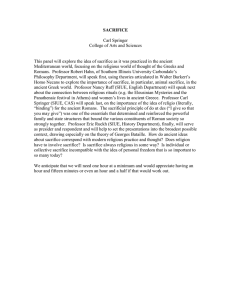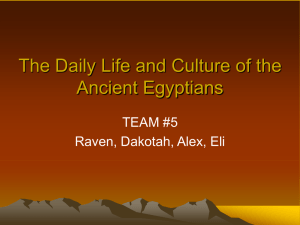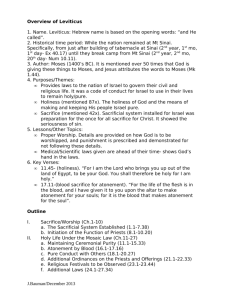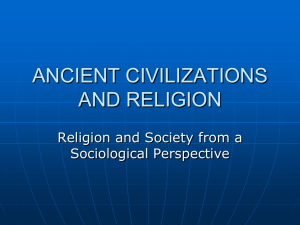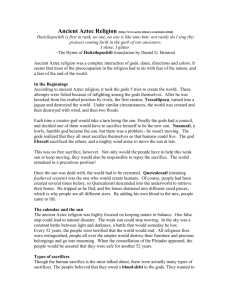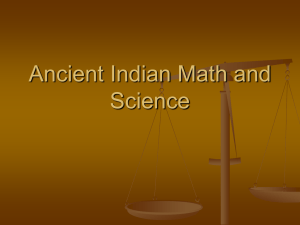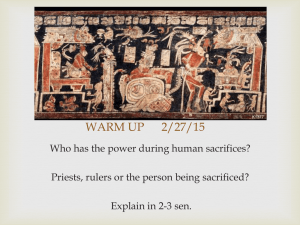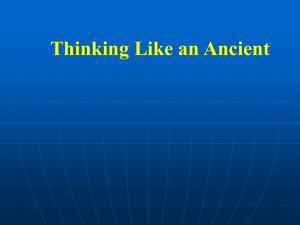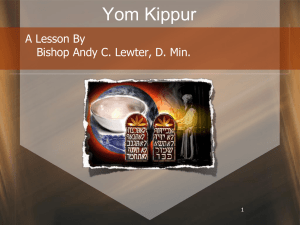John Henry Newman on Natural Religion
advertisement
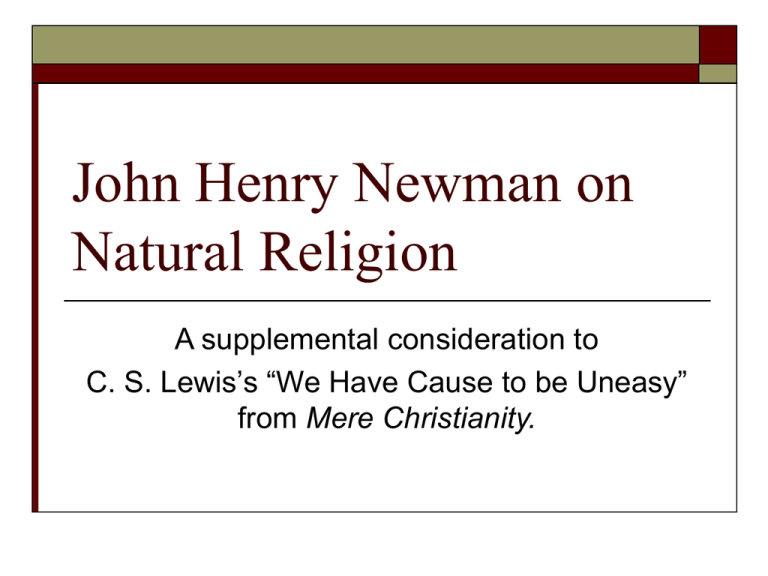
John Henry Newman on Natural Religion A supplemental consideration to C. S. Lewis’s “We Have Cause to be Uneasy” from Mere Christianity. Who is John Henry Newman? Born 1801, attended Trinity College, Oxford. Entered ministry in the Church of England. Received into the Catholic Church at age 45. Was made a cardinal, shortly before his death at age 89. Newman discusses “natural religion” in the Grammar of Assent. In this book, he explored the elements of religious conversion, e.g. “What allows one to submit one’s will in faith?” Among these elements, he identified “natural religion” that is, our natural knowledge of our duties to God. Before “Revealed Religion” comes “Natural Religion.” That there is a Being (or beings) that have made man, and to whom he owes obedience. That disobedience to this Being is sin, and merits retributive punishment. That there are ways to atone (“make up”) for sin, e.g. sacrifice of one’s goods. That this Being reveals Himself, and listens to the prayers of men. Newman identifies three sources of natural religion. Our own minds (conscience) Voice of mankind (cultural beliefs and rituals) Course of nature (providence) Through conscience we know that there is a God from whom we receive the moral law. The god Marduk giving the law to Hammurabi, Babylonia Moses receiving the Law from God, Ancient Hebrew Through conscience we know God first as a lawgiver, then as a judge. Judgment of Soul, Ancient Egypt Traditional religion shows its “dark side outward” – bad news first. It is founded on the sense of sin. Its many varieties all proclaim or imply that man is in a degraded, servile condition. It demands expiation, reconciliation, and some great change of nature. Traditional religions emphasize man’s impurity, his need for cleansing. Ritual purification in Ganges by Hindus Initiation into the Eleusian Mysteries, Ancient Greece. Central to natural religion is a priesthood that intercedes for the people. The priest belongs to an elect group. He prays as a mediator for the people. Most importantly, he offers sacrifice in atonement for sins. Sacrifice characterizes religions around the world and throughout history. Ancient Greeks sacrificing a pig Ancient Egyptians preparing to sacrifice an ox. Sacrifice is an act of atonement, “making up” for sin. Hebrew priest offering a holocaust in the Temple Atonement implies the “substitution of something offered, or some personal suffering, for a penalty which would otherwise be exacted.” All nations, cultures and periods of history have ritual forms of atonement and expiation. By contrast, “civilized” religion is more cheerful! This is not an organic development with natural religion, but a break. It leaves behind all notions of sin and guilt – it is wholly artificial. Nature gives a mixed message – it offers blessings, but suffering as well! Natural religion has a “bright side” as well as a “dark side.” Religion offers hope of benefits from the gods. Sacrifice and atonement imply that the gods can be appeased. Prayer implies that they listen to our petitions. Ancient Romans praying to the “household gods.” When Paul preached to the pagans, he said that God had made Himself known to them through providence of nature. (Acts. 17) Revelation is a blessing of natural religion – the gods reveal themselves. Disciple being lead by Thoth (Ancient Egypt) Angels appear to Abraham (Ancient Hebrew) What is natural religion? The natural knowledge we have of our duties to divine authority. Possible to us without Revelation. Indeed, prepares men for it. Even in Christians, it cannot be separated from their Christianity.
